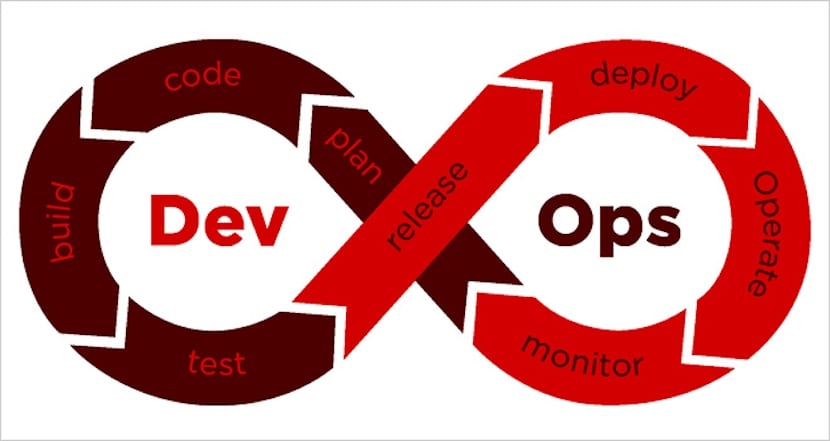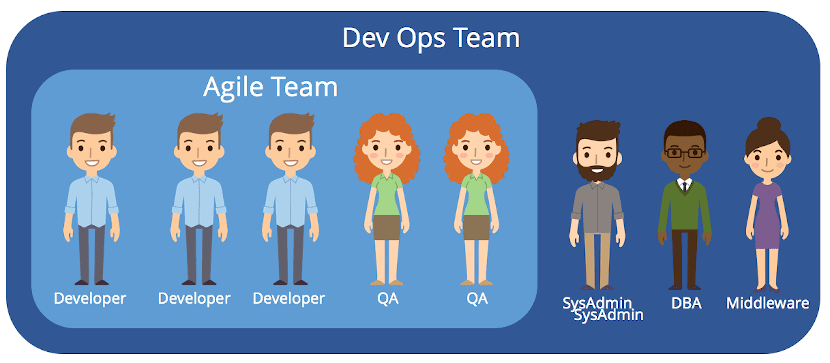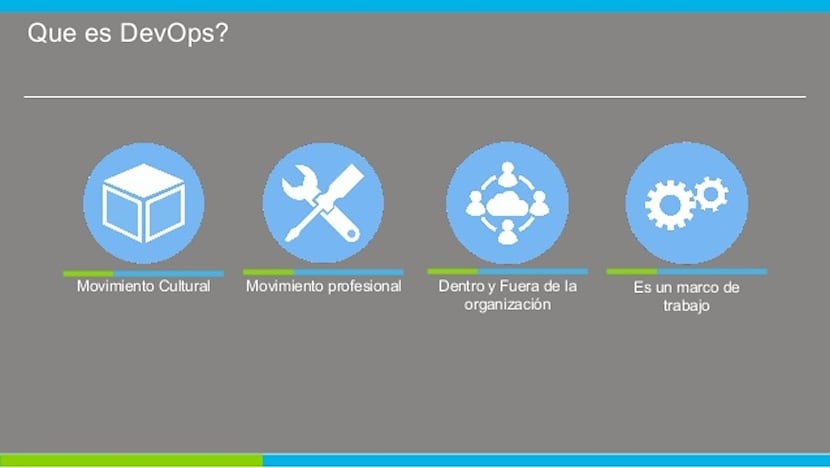
DevOps versus SysAdmin: Rivals or Collaborators?
A few posts ago we were talking about SysAdmins, specifically in the post called «Sysadmin: The Art of Being a System and Server Administrator ». And we said that they were a kind of «... experienced all-in-one IT Professional, whose normal day is usually filled with a large number of varied activities, scheduled or not ...» and «... the person responsible for ensuring the proper functioning of every technological platform and IT where you work,… ».
In this post we will talk about DevOps, that kind of new "breed" (generation) of Software Developers, which has been heard about for about eight or ten years. This new generation of programmers born from the entrails of the Technological Centers and modern IT Companies of high world renown, and which owes its name to the term derived from the English words “Development” and “Operation”.

Introduction
In a few words, we could say that a DevOps is a programmer capable of performing all the functions that intervene in the life cycle of "Software Development" and more., such as: Programming, Operation, Testing, Development, Support, Servers, Database, Web and any other that is necessary.
It is said that this new "Generation of Software Developers" arose in those small, modern and successful "Tech Startups" made up of small groups of "IT Specialists", mainly Software Developers.
And as we already know, these "Startups" generally do is develop expedited software solutions (from 6 to 12 months) and thus solve specific and complex problems and needs in the real world. This means that they tend to have an extremely high mortality rate.
From that reality lived in these Startups originates a new «Software Development Culture» based on the philosophy known as «Release Early, Release Often» (Early Releases, Frequent Releases) where the Software is modified and launching «On Fly» (In flight), that is to say, on the fly to be used immediately by the users of the same.
Users who fed Developers from "Feedbacks" obtained with those who made improvements and updates to the code on the fly.
This new "Culture of Software Development" has been changing the "traditional Culture of Software Development" where each member of an «IT Unit» (Computing / Technology) has a position with well-defined and specific functions, such as: Junior Developer, Senior Developer, Database Administrator, Systems and / or Servers Administrator, Analyst and / or Applications Tester, Technical Support, among others.
This situation is precisely what makes a DevOps look a lot like a SysAdmin, that is to say, small Businesses of great activity that try to reduce the size of the personnel of IT Specialists to produce a reduction of the operating costs of the same and all the organization. Giving rise to "Software Developers" and "System and Server Administrators" who handle many areas and multi-disciplinary functions of technology in common.
Therefore, DevOps is not just a person or a position, it is also a trend, a movement, a very widespread organizational culture today. About which you can learn more by reading these other 2 articles called: «DevOps" Y "What is DevOps?«.

Contents
The foregoing is precisely why currently DevOps and Sysadmin are literally seen as a "Jack of all Trades" or "Master of None", that is, "Servants of everything" or "Masters of nothing", since they are capable of "doing everything or many things without becoming an expert in anything."
Which tends to devalue the value of these professionals in the labor market, since long-term specialization is the best investment for a professional and an organization. This is because information technology is composed of multiple and extensive areas of knowledge that it is virtually impossible to completely master (learn, retain, update) for a single professional.
For a DevOps or a Sysadmin to have the intellectual capacity to solve almost any technological problem that arises implies a very high cognitive cost, What favors that they tend to present certain degrees of «Work stress» (Burn Out), and consequently suffer a decrease in their productivity or work efficiency.
Sysadmin
Sysadmin tend to encompass the following functions and activities:
- Implement new or remove obsolete
- Make backups
- Monitor performance
- Manage configuration changes
- Operate Applications and Operating Systems
- Manage user accounts
- Monitor computer security
- Coping with failures and falls
- Meet user requirements
- Report to the direct responsible levels of the Organization
- Document the computing activities of the System and the Platform
And you have to have some knowledge of:
- Programming Languages
- Databases
- Informatic security
- Industrial
- Operating Systems
DevOps
DevOps tend to be fluent in a wide variety of programming languages, in addition to possessing technical capabilities and management skills. A DevOps is usually also a mix of Software Developer and Sysadmin whose function is usually seen as an elimination of the barriers between both profiles. So it is to be expected that a DevOps has knowledge of both the Software and the Hardware (Infrastructure / Platform) of the Organization where they work.
Therefore, DevOps are usually able to:
- Write code and perform the function of a Programmer.
- Manage Multi-Platform Servers and perform the function of a SysAdmin.
- Manage Networks and perform the function of NetAdmin.
- Manage a database (BD) and perform the function of a DBA.
This leaves us in conclusion that a good DevOps:
It is capable of performing the minimum activities and functions of each area specialist in an IT Unit. Which is not often the case in the reverse case, for SysAdmins and other IT SpecialistsAs a SysAdmin, a NetAdmin, a DBA or a Technical Support Specialist, generally does not tend to consistently and efficiently write code in high-level or commercially popular languages.
What leaves us with that a DevOps, usually has a knowledge that allows him to replace all the others, without being the same in reverse. And this makes DevOps more appreciated in the labor market, that is, they are fashionable and every small or medium organization (mainly) wants one, causing a devaluation of the rest of the traditional positions within an IT Unit.
And that these 2 positions are of different nature, although they share many common tasks. Differences such as that DevOps:
- They collaborate at a high level with the Organizations and guarantee synergy in each section of the company, while the SysAdmin are more focused on Manage (Configure, Maintain and Update Servers and computer systems).
- They tend to work more often on projects with an end-to-end product, while SysAdmins tend to be more limited to a smaller scope and (one-off) responsibility regarding the same projects / products.
- They can usually do everything that a SysAdmin does, but a SysAdmin cannot usually do everything that a DevOps does.

Conclusion
The objective pursued by the term "DevOps" as an organizational trend or culture is to promote team culture, based on collaboration and communication between individuals from the different areas involved in Software Systems Development. Therefore, the «DevOps» in an Organization favors the integration between the members of the Software Developers area, the System Operators, or the System and Server Administrators, trying to make it more perfect, transparent and friendly.
Although some within Organizations tend to see the opposite effect, that is, to see how the DevOps culture represents the destruction of most of the roles within IT Units. For example, how programmers tend to go DevOps and then replace SysAdmin, NetAdmin, DBA, Support Specialists and so on, including Software Developers who just write code.
If you have more questions about this topic, I recommend that you read the work paper related to it found in this link.
As is always said, knowledge does not take place. Specializing and being an "all terrain" in certain areas becomes of great value for any professional, but this should not imply job insecurity, allowing the market to take advantage of it to reduce the value of two great professionals at the price of one.
Certainly I think that happens a lot in Latin countries where they want the SysAdmin to serve even coffee ... Everyone does their thing even if one knows how to make even coffee 🙂
What a good post! I love the way you tackled like fifteen hundred concepts in something so compact but precise. A topic with a long debate and countless opinions but personally I strongly agree, what I think in order not to be a "good at everything" is to bet on the DevOps stage that you like over the others and attack that with a specialty.
Thanks for the text!
Thank you for your positive comments, I am very happy that you and many others have liked the publication.
Excellent post. Ideally, DevOps should reflect the culture of teamwork. There is no doubt that DevOps must have deep knowledge of all the areas involved in the Development of Software Systems but it is also evident that the amount of work that this task implies requires more than one person, each one where possible with a specific knowledge.
Unfortunately I think that many medium and / or small companies wrongly prioritize economic issues, if they have an all-terrain, why hire someone else? Forgetting that in the long run cheap things tend to be very expensive.
I am a simple amateur in this of systems development but I know the difficulties of having to deal only with something as simple as creating and managing a website for a very small organization that does not have the money to hire a team.
In summary, perhaps I am wrong, I think that it is going towards a fusion of the two functions depending fundamentally on the economic capacity of the organization for which it works and secondarily on its work philosophy.
This is the article about only the Sysadmin, for those who want to expand the reading on them a little more!